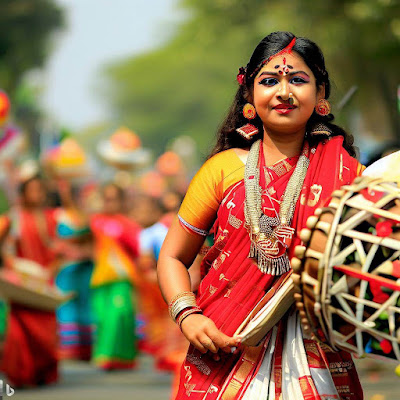Poila Boisakh, also known as Bengali New Year, is a festival celebrated in West Bengal and other parts of India on the first day of the Bengali calendar, which usually falls on April 14th or 15th. The festival marks the beginning of the new year for Bengali people and is a time for renewal, joy, and celebration.
On Poila Boisakh, people dress up in new clothes and visit temples to offer prayers and seek blessings. They also clean their homes and decorate them with rangolis (colorful designs made with powder or flowers) to welcome the new year. Traditional Bengali dishes, such as pitha (rice cakes), jhal muri (spicy puffed rice), and roshogolla (a sweet made from cottage cheese) are prepared and enjoyed with family and friends.
In West Bengal, Poila Boisakh is celebrated with great fervor and is considered one of the most important festivals of the year. Cultural programs, including music, dance, and drama, are organized in various parts of the state, and people participate in processions and parades to showcase the rich cultural heritage of the region.
Overall, Poila Boisakh is a time for joy, renewal, and celebration for Bengali people, both in India and around the world.
Why its celebrate?
Poila Boisakh is celebrated as the Bengali New Year and marks the first day of the Bengali calendar. It is believed to have originated during the Mughal rule in India, when the emperor Akbar introduced the Mughal calendar, known as the Tarikh-e-Elahi. However, the Bengali community continued to follow the traditional Hindu solar calendar and celebrated the new year on the first day of the month of Baisakh.
The celebration of Poila Boisakh is also associated with agricultural traditions, as the month of Baisakh marks the beginning of the harvesting season in West Bengal. The festival is a time for farmers to thank the gods for a bountiful harvest and to seek blessings for the coming year.
Over time, Poila Boisakh has become an important cultural festival for Bengali people, both in India and around the world. It is a time for renewal, joy, and celebration, and is marked by various cultural programs, feasts, and family gatherings. The festival also provides an opportunity for Bengali people to showcase their rich cultural heritage and to reaffirm their sense of community and identity.
How to celebrate?
Poila Boisakh, the Bengali New Year, is celebrated with great enthusiasm and joy by Bengali people all over the world. Here are some traditional ways to celebrate the festival:
Wear new clothes: Bengali people traditionally wear new clothes on Poila Boisakh to symbolize a fresh start to the new year.
Clean and decorate homes: Homes are cleaned and decorated with colorful rangolis, flowers, and other decorations to welcome the new year.
Visit temples and seek blessings: Bengali people visit temples and offer prayers to seek blessings for the coming year.
Prepare traditional dishes: Bengali cuisine is an integral part of Poila Boisakh celebrations, and traditional dishes such as pitha (rice cakes), jhal muri (spicy puffed rice), and roshogolla (a sweet made from cottage cheese) are prepared and enjoyed with family and friends.
Organize cultural events: Cultural programs, including music, dance, and drama, are organized in various parts of West Bengal and other regions with significant Bengali populations.
Participate in processions and parades: Processions and parades are organized in various parts of West Bengal, and people participate in them to showcase the rich cultural heritage of the region.
Exchange gifts and greetings: Bengali people exchange gifts and greetings with family, friends, and neighbors to mark the occasion and strengthen relationships.
Overall, Poila Boisakh is a time for joy, renewal, and celebration for Bengali people, and is marked by various traditional and cultural activities.
Where its celebrate in india?
Poila Boisakh, the Bengali New Year, is celebrated primarily in the Indian state of West Bengal, which has a significant Bengali population. The festival is observed in various parts of the state, including the capital city of Kolkata, as well as in other parts of India with a significant Bengali population, such as Tripura, Assam, and parts of Jharkhand and Odisha.
In Kolkata, Poila Boisakh is celebrated with great enthusiasm and is one of the most important festivals of the year. The city is decorated with colorful lights and decorations, and cultural programs, including music, dance, and drama, are organized in various parts of the city. People also participate in processions and parades, showcasing the rich cultural heritage of the region.
In other parts of West Bengal and India, Poila Boisakh is celebrated with similar traditional and cultural activities, including visiting temples, preparing traditional dishes, exchanging gifts and greetings, and organizing cultural events. Overall, Poila Boisakh is a time for joy, renewal, and celebration for Bengali people, both in India and around the world.
Poila Boisakh wishes in Bengali language that you can use to wish your loved ones:
শুভ নববর্ষ! আপনাকে ও আপনার পরিবারকে জানাই সুখ, সমৃদ্ধি এবং শান্তির পূর্ণ হক। (Shubho Noboborsho! Aponake o apanar paribarke janai shukh, samriddhi ebong shantir purno hok.)
পয়লা বৈশাখে আপনাকে নতুন আশা, নতুন সুযোগ এবং নতুন শুরুর জন্য শুভেচ্ছা। (Poila Boisakh-e aponake notun asha, notun suyog ebong notun shurur jonno subhechcha.)
পয়লা বৈশাখ আসছে। আসুন সবাই নতুন সুযোগ এবং সুখ নিয়ে হাসির দিন কাটাই। (Poila Boisakh ashche. Asun sabai notun suyog ebong shukh niye hasir din katai.)
শুভ নববর্ষের আনন্দ ও উল্লাস নিয়ে পয়লা বৈশাখ আমাদের পৌরাণিক সংস্কৃতি উজ্জ্বল করুক। (Shubho Noboborsho-er anondo o ullas niye Poila Boisakh amader pauranik shongskriti ujjwal koruk.)
আসুন আমরা পয়লা বৈশাখে নতুন সুযোগ এবং সফলতা নিয়ে স্বাগত জানাই। (Asun amra Poila Boisakh-e notun suyog ebong shofolota niye swagot janai.)
পয়লা বৈশাখের শুভেচ্ছা। আশা করি এই নতুন বছর সবার জন্য আনন্দ পূর্ণ হোক এবং সকলের জীবনকে সুখ, শান্তি এবং উত্তম অবস্থায় পরিবর্তন করুক। (Purno hok ebong sakaler jibonke sukho, shanti ebong uttom avasthay poriborton koruk.) - Translation: "May it be fulfilled and may it bring happiness, peace, and positive change to everyone's life."







Comments